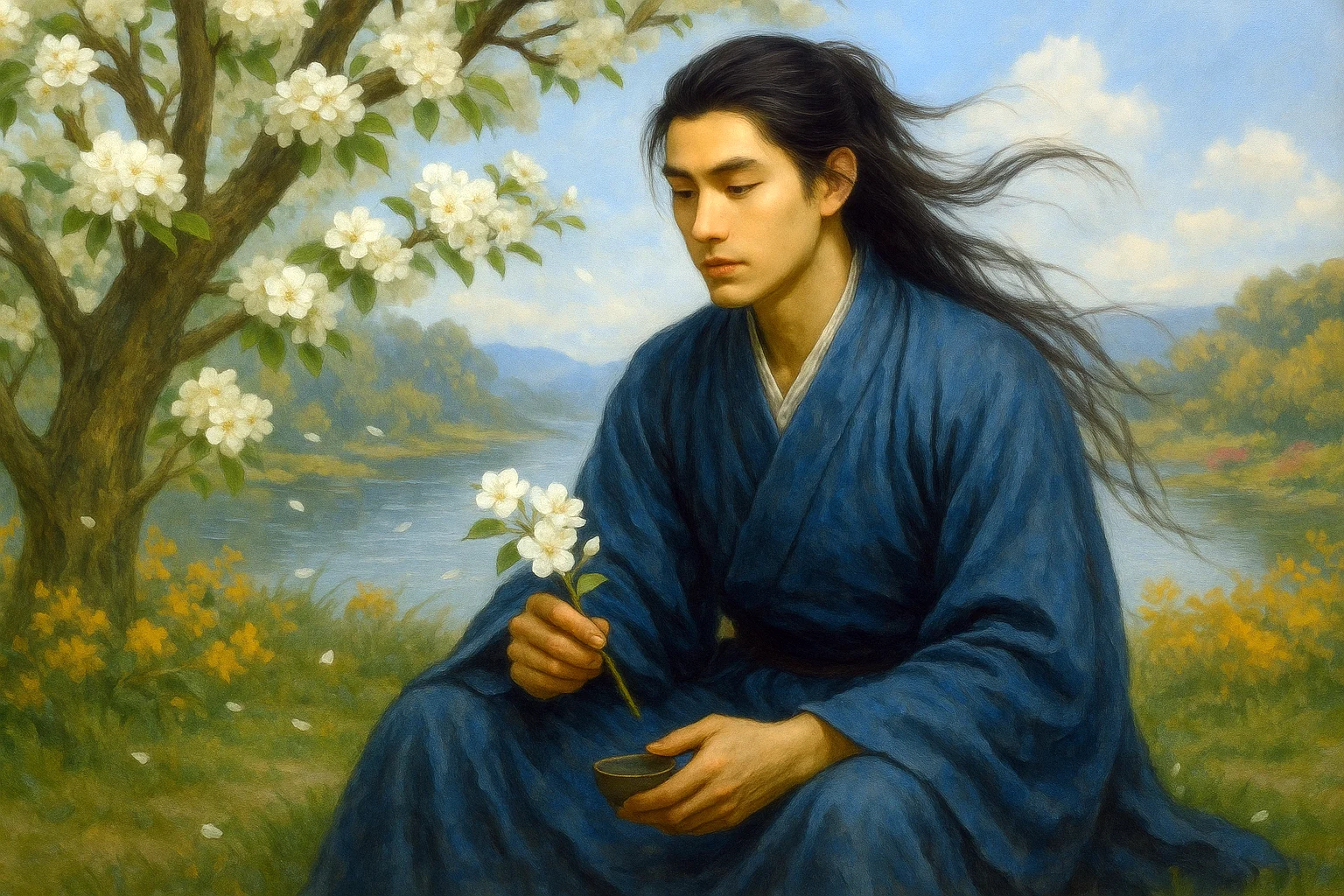Green wheat fields bask 'neath cloud-shadows long,
The ancient temple's hushed, with grass o'ergrown.
Young swallows fetch mud by the well's mossed stone,
While cooing doves brush blooms, winging along.
A thousand years of lichens stain your mountain shoes,
Ten thousand feet of vines kiss the lake's blue face.
Here by the river, sick and old, I'd end my days—
Who knew a gifted friend would seek this lonely place?
Original Poem
「野寺病居喜卢纶见访」
李端
青青麦垄白云阴,古寺无人新草深。
乳燕拾泥依古井,鸣鸠拂羽历花林。
千年驳藓明山履,万尺垂萝入水心。
一卧漳滨今欲老,谁知才子忽相寻。
Interpretation
Penned during Li Duan's later years while convalescing in a remote mountain temple, this work captures the poet's solitude amidst illness until an unexpected visit from his dear friend Lu Lun (fellow luminary of the "Ten Talents of Dali Period") stirs profound emotion. Through vivid depictions of the wilderness monastery and the solace of friendship, the poem radiates human warmth and celebrates intellectual kinship.
First Couplet: "青青麦垄白云阴,古寺无人新草深。"
Qīngqīng mài lǒng báiyún yīn, gǔ sì wú rén xīn cǎo shēn.
Emergent wheatfields bask under cloud-dappled skies;
Untrodden temple courtyards drown in newborn grasses.
The opening immerses us in tranquil desolation. "Cloud-dappled" (白云阴) and "newborn grasses" (新草深) construct a sanctuary of stillness, where nature's quiet reclamation mirrors the poet's contemplative isolation.
Second Couplet: "乳燕拾泥依古井,鸣鸠拂羽历花林。"
Rǔ yàn shí ní yī gǔ jǐng, míng jiū fú yǔ lì huā lín.
Fledgling swallows gather clay by ancient wells;
A turtledove preens through blossoming boughs.
Life persists in delicate details—the swallows' busy beaks and the dove's plumage brushing petals (拂羽) inject vitality into the solitude. These miniature tableaux reveal the poet's attunement to nature's quiet miracles despite infirmity.
Third Couplet: "千年驳藓明山履,万尺垂萝入水心。"
Qiānnián bó xiǎn míng shān lǚ, wàn chǐ chuí luó rù shuǐ xīn.
Millennial lichens trace mountain paths like footsteps;
Vines cascade a thousand feet to kiss the pool's heart.
Time becomes tangible: lichens (驳藓) inscribe eons on stone, while waterfalling vines (垂萝) bridge earth and water. This vertical landscape—from mountain to abyss—embodies the poet's deep-time communion with wilderness.
Fourth Couplet: "一卧漳滨今欲老,谁知才子忽相寻。"
Yī wò Zhāng bīn jīn yù lǎo, shéi zhī cáizǐ hū xiāng xún.
Here by the Zhang River, I've aged through sickbed days—
When lo! My radiant friend appears as spring surprises winter.
The climax pivots from meditation to human connection. "Radiant friend" (才子) carries the sunburst joy of unexpected companionship, thawing the chill of convalescence. That final "appears" (忽相寻) thrums with the electricity of reunion—an epiphany of friendship's healing power.
Holistic Appreciation
The poem transitions seamlessly from scenery to sentiment, unfolding with crystalline clarity. Through delicate yet understated language, the poet paints a tranquil scene of convalescence in a mountain temple, interwoven with imagery of nesting swallows, cooing doves, trailing vines, and mottled moss—infusing the setting with vibrant natural vitality. Here, human presence lingers within the landscape, and emotion dwells within the scenery, blending the solitude of illness with the warmth of a friend's visit. The result is a work of quiet profundity and resonant feeling, where serenity and tenderness coexist.
Artistic Merits
- Emotion Embodied in Scenery: The hushed beauty of the springtime temple mirrors the poet’s solitude and equanimity during illness, revealing depth within stillness.
- Unadorned Brushstrokes, Expansive Vision: The poem’s language is spare and unembellished, yet its layers unfold with clarity, achieving a far-reaching artistic realm.
- Exquisite Details, Dynamic Composition: Vivid touches—"young swallows gathering mud," "a dove preening its wings"—capture nature’s vitality, contrasting with the quiet chill of the sickroom to create a painterly rhythm.
- Unforced Sincerity: The closing lines, expressing gratitude for the visit, flow with natural grace—unpolished yet lingering in the mind like a gentle afterglow.
Insights
This poem reminds us: in times of hardship and isolation, the arrival of a kindred spirit becomes life’s most tender solace. Amid the temple’s solitude and his own frailty, Li Duan finds serenity in nature’s quiet beauty and comfort in friendship’s grace. He shows us that even in the face of loneliness and aging, poetry and human connection can still illuminate life’s moments. Like that unexpected visit, which brightens not just the mountain temple but also a heart long steeped in silence.
About the Poet

Li Duan (李端, c. 743–785), a native of Zhaoxian in Hebei Province, was among the "Ten Literary Talents of the Dali Era" during the Mid-Tang period. He excelled particularly in five-character regulated verse, crafting poetry of refined elegance and subtle nuance. His works frequently explored themes of reclusive living and the melancholy of separation, with over 250 poems preserved in the Complete Tang Poetry anthology.












